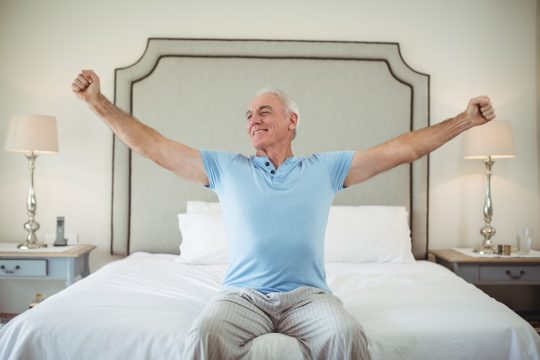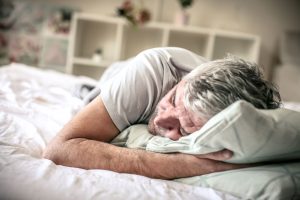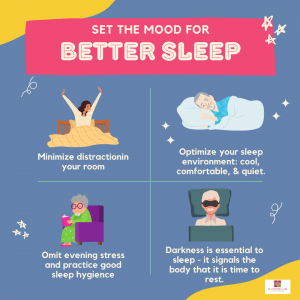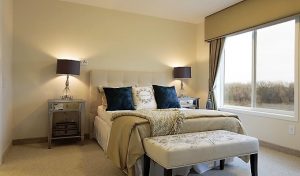
Sleep is a fundamental human need. Like eating, drinking, and breathing, sleeping is vital for good health and well-being.
Yet poor sleep quality is one of the most common problems that seniors face daily. Nearly one-quarter of Canadians report symptoms of insomnia and one-third sleep for less than the recommended number of hours. This leaves them feeling tired during the day and can impact their ability to fully enjoy retirement.
With this in mind, we’ve put together some of the most up-to-date information on sleep and 8 strategies to help older adults sleep better.
Sleep and Aging: Do You Need Less Sleep as You Age?
According to the National Institute on Ageing, this commonly held belief is a myth. While it is true that sleep patterns change throughout the lifespan, overall, an aging individual’s sleep needs remain the same in terms of duration (7-9 hrs/night) as when they were younger.
Adults over 60 years of age often see their sleep-wake cycle change in the following ways:
- Earlier bedtimes and wake-up times
- Lighter sleep, especially during the second half of the night
- Changes in sleep architecture such as difficulty remaining asleep and less time spent in deep sleep.
Why is sleep so important?
We spend about 1/3 of our lives sleeping, and quality sleep is a vital indicator of overall health and well-being, especially for older adults.
In his ground breaking book, “Why We Sleep”, Neuroscientist and sleep expert Matthew Walker explains that within the brain, sleep supports a diversity of functions, including our ability to learn, memorize, and make logical decisions. It recalibrates our emotions, restocks our immune system, fine-tunes our metabolism, and regulates our appetite. Dreams act as an “overnight therapy”, helping people solve problems and process emotions.
Don’t Ignore Insomnia
Sleep disturbance in seniors is often caused by chronic pain or frequent trips to the bathroom in the night but can also signal other health conditions. Speak with your doctor if you have trouble sleeping. He or she will review your symptoms and may run tests to rule out a physical condition that might be affecting your sleep.
Eight Ways to Enhance your Sleep
You might not be able to control all the factors that interfere with your sleep. However, you can adopt habits that encourage a good night’s rest. Try these 8 non-medication-based sleep habits that are the first choice for improving sleep in older people.
You might not be able to control all the factors that interfere with your sleep. However, you can adopt habits that encourage a good night’s rest. Try these 8 non-medication-based sleep habits that are the first choice for improving sleep in older people.
1. Set the mood for sleep
Also known as sleep hygiene, good sleep habits act as a signal to your body and brain that it is time to nod off. Try this helpful acronym to get yourself in the MOOD for sleep.
M – minimize distractions in your room. Interestingly, a 2015 study showed that those with a cluttered bedroom were more likely to have disordered sleep than those with a small, well organized room.
O – Optimize your environment.
- Have a comfortable mattress and a pillow suited to your preferred sleep position.
- The recommended temperature for optimal sleep is 16-19 C (60-67 F).
- Peace and quiet make for bedroom bliss: consider ear plugs or white noise.
O – Omit evening stress. Take time to do your favourite relaxing activity before bed and turn it into a ritual.
D – Darker is better. Light is the most important external factor affecting sleep, so use blackout curtains or blinds. Also, be aware of digital clocks or TV lights in the bedroom that may be keeping you awake.
2. Get enough sunlight
Natural sunlight increases sleep quality. When you are exposed to sunlight in the morning hours, it leads to a synchronization of your circadian rhythm. Experts say that 30 mins to 1 hr of exposure can significantly reduce sleep problems. You can also use it as an opportunity to practice mindfulness!
3. Be sure to exercise
Exercise is an important part of sleep hygiene. Not only does it tire your muscles, having an active lifestyle relieves stress and improves mood. The best time for older adults to exercise is a time that suits you. This is because habit matters more than time of day. Go for consistency.
4. Establish a worry-free zone
Not being able to sleep is frustrating! And being anxious about sleep almost always compounds the problem. It is therefore important to start using the bedroom as a “worry-free zone”. Your bedroom should feel like a sleep oasis — stress and distraction-free. If you have trouble falling asleep, or wake in the night feeling restless, don’t stay in bed awake. Doing so trains the brain to think that your bed is not a place for sleeping. Instead, get up and do something relaxing in another room. Or if you don’t want to get out of bed, try meditating. Studies suggest it helps individuals fall asleep faster and improves sleep quality.
5. Turn off electronics
Looking at screens during the hour before bed is a sleep sabotaging habit. The reason is 3-fold: screens keep your mind psychologically engaged, delay REM sleep by increasing anxiety, and emit blue light that further suppresses melatonin in the brain. Smartphones are typically the main culprit, but even tablets and TVs can emit blue light that contribute to poor sleep.
6. What about napping?
 While napping tends to get a bad rap, it turns out that taking a nap may be beneficial for older adults. The trick is to keep it short. Nap no more than 20-30 minutes in the early in afternoon. Also, plan naps so that your body remains on a consistent schedule.
While napping tends to get a bad rap, it turns out that taking a nap may be beneficial for older adults. The trick is to keep it short. Nap no more than 20-30 minutes in the early in afternoon. Also, plan naps so that your body remains on a consistent schedule.
7. Listen to music
Most often credited with inspiring people to dance, listening to music may also improve your ability to fall asleep. Research shows that older adults who listen to soothing music 45-minutes before bed experienced improved sleep quality, a decreased amount of time to fall asleep, and increased sleep efficiency. Why? Music soothes autonomic nervous system.
8. Practice 4-7-8 breathing
Also known as the “relaxing breath”, this technique involves inhaling for 4 seconds, holding the breath for 7 seconds, and exhaling for 8 seconds. The effects may be subtle when you first try it, but repetition and practice reduce anxiety to help people fall asleep faster.
Also known as the “relaxing breath”, this technique involves inhaling for 4 seconds, holding the breath for 7 seconds, and exhaling for 8 seconds. The effects may be subtle when you first try it, but repetition and practice reduce anxiety to help people fall asleep faster.
Coping with Daylight Savings Time
The biggest problem that older individuals have with daylight saving time is loss of sleep. And “springing forward” can be particularly difficult for seniors.
The transition to Daylight Saving Time doesn’t have to be daunting. With thoughtful preparation and a toolbox of strategies for helping seniors – especially those with cognitive decline, caregivers can help ease the effects of the time change and change of seasons.
Remember, you are not alone on this journey. If you and your loved one lives in an All Seniors Care residence, there’s a community of caregivers and healthcare professionals ready to support you.
If you’d like to know more about the benefits of sleeping in All Seniors Care suites, click here to find a senior care centre near you. Offering independent and assisted living in Alberta, Manitoba, Ontario, Saskatchewan, and Quebec, at All Seniors Care Living Centres you can feel comfortable and in control of your sleep environment.
Writer – Julianna McLeod
Julianna is a health and wellness expert at All Seniors Care. Her mission is to create content that empowers seniors to form sustainable solutions for lasting health and happiness. She is an experienced writer, editor, and Recreational Therapist living in Toronto.


